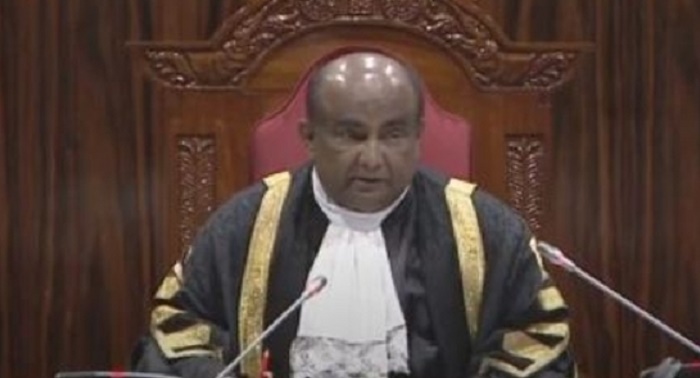
The Supreme Court of Sri Lanka has determined that the Bureau of Rehabilitation Bill as a whole is inconsistent with article 112 (1) of the Constitution, Speaker Mahinda Yapa Abeywardena announced in Parliament today (20).
The Speaker said that and as such, it may be enacted only by the special majority required by Article 84 (2) of the constitution.
However, this inconsistency shall cease,
(a) if all references to ex-combatants, violent extremist groups, and any other group of persons are deleted from the Bill.
(b) if the Bill is limited to the rehabilitation of drug-dependent persons and such other persons as may be identified by the law.
As per Clause 3, 4 (a), 4 (b), 6 (b), 23, 24, 25 (2), 27, 28 (1), 34, 35, and 37, (the definition of rehabilitation) of the Bill are inconsistent with Article 12 (1) of the Constitution. And as such, may be enacted only by the special majority required by Article 84 (2) of the constitution.
However, this inconsistency shall cease if the clauses are amended as follows;
Clause 3, the objective of the Bureau shall be to rehabilitate drug-dependent persons or any other persons as may be identified by the law as a person who requires rehabilitation and which may include treatment and adoption of various therapies in order to ensure effective reintegration and reconciliation through developing socio-economic standards.
Clause 4 (a), provide treatment and rehabilitation to drug-dependent persons who in terms of (The Drug-dependent Persons Treatment and Rehabilitation Act) No 54 of 2007 request treatment and rehabilitation are required by such laws to be provided with treatment and rehabilitation.
Clause 4 (b), provide rehabilitation to any person who in terms of a relevant law request rehabilitation or is required by such law to be provided with rehabilitation.
Clause 4, by the insertion of the following new paragraph E, “advice the ministers with regard to programmes for rehabilitation, treatment, and aftercare having regard to the basic norms of human rights”.
Clause 6 (b), “ the following five members hereinafter referred to as appointed members to be appointed by the minister.
- Two persons who possess academic and professional qualifications to have experience in the field of rehabilitation
- Two persons who possess academic and professional qualifications and have experience in the field of social integration
- One person who shall possess academic and professional qualifications and have experience in the field of law and order
Clause 23, by the deletion of the words ex-combatants, members of violent extremist groups, violent extremist persons, and any other persons or group of persons. And this clause being suitably amended to reflect the position that only the rehabilitation of drug-dependent persons and such persons who are identified by law and whose rehabilitation is provided by law will take place at a centre managed by the Bureau.
Clause 23, by the insertion of new sub-clauses, numbered as Clauses 23 (2) to 23 (7) as proposed by the Attorney General and referred to pages 36 and 37 of the determination subject to the following;
- Clause 23 (3) (a), by insertion of words and maybe examine the records and log books maintained by the centre at the end of this paragraph.
- Clause 23 (5), by the addition of words including an order that such person be immediately admitted to a government hospital for medical treatment and the officer in charge of such a centre immediately inform the court that made the order for the rehabilitation of such person of the findings of government medical officers at the end of this clause.
Clause 34 (1), “the council shall not have the power to make rules in respect of any matters in which regulations are required to be made in terms of this Act.”
Clause 37, “ Rehabilitation means the procedures and programmes for rehabilitation, treatment, aftercare, and support and shall be prescribed by regulations made under this Act.
The Speaker further said Clause 17 of the Bill is inconsistent with Article 12 (1) of the Constitution and such may be enacted only by the special majority required by Article 84 (2) of the constitution.
Clause 25 (1), is inconsistent with Article 114 (a) of the Constitution and as such may be enacted only by the special majority required by Article 84 (2) of the constitution.
However, the said inconsistency shall cease if Clause 25 (1) is amended by adding the words or the provisions of the Right to Information Act at the end of the said clause.
Clauses 26 and 28 (2) of the Bill are inconsistent with Article 11 of the Constitution. As such, may be enacted only by the special majority required by Article 84 (2) of the constitution and upon being approved by the people at a referendum as stipulated by Article 83 of the Constitution.
The said inconsistencies may cease if the words “without reasonable cause” in Clause 26 are deleted.
Clause 29 of the Bill is inconsistent with Article 76 read together with Articles 3 and 4 of the Constitution. As such, may be enacted only by the special majority required by Article 84 (2) of the constitution and upon being approved by the people at a referendum as stipulated by Article 83 of the Constitution.
The Speaker added that the Supreme Court’s determination will be printed in the official report of today’s Parliament proceedings. (NewsWire)
